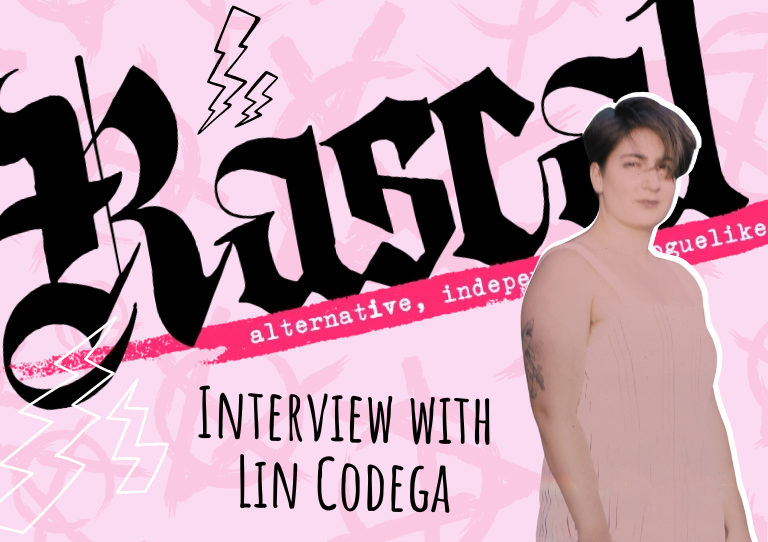Interview with Lin Codega of Rascal News
April 30th, 2024
I sit down with Lin Codega from Rascal News and chat about TTRPGs, Rascal's mission, and the world of journalism!

Life has been incredibly hectic these days for a lot of us creatives. The same could be said for Lin Codega, journalist and Co-Founder of Rascal News, a burgeoning TTRPG news site unapologetically punching a poignant and honest hole in the space. In the middle of job insecurity, online discourse, and universal anxiety, we had a moment to breathe and chat.
Why “Rascal”? What does the name mean to you, and the team as a whole?
Oh, boy. Well, there was kind of a joke between me and another member of the tabletop industry, where they were like, “Yeah, you're a bit of a rascal.” And I'm like, “Yeah, put it on my grave - rascal and a truth teller.” And it was just sort of like this inside joke. And then, when I was thinking about a name for the site, I went through a couple of iterations: knuckle bone, rattle bone, kind of like going with the sort of hints towards this vision of gaming, as this thing that has been around since the beginning of humankind. And then it was like, “Well, what are we doing at this outlet?” And I'm like, “Well, we are going to be rascals. We are going to ask questions no one wants to ask, we're going to write the things that nobody wants to publish. And we are going to find the stories that nobody else is writing.”
That is a very punk mindset. Are there any elements of the punk movement that inspired you all to adopt that persona or move forward in this industry?
I collect punk records from the 70s. I don't really collect very much of anything. I don't collect cards or games or anything, but I collect records. And we really liked the idea of describing ourselves as more anarchists, as a more anarchist organization than a socialist or communist organization. Because we are working from a space of radical equality, radical equity within our structure. Nothing gets done unless we all say it gets done. We're trying to find ways for when we eventually take on contributors to give them a sense of worker ownership, as much as possible or as much as we can, and we genuinely do not know what that looks like because it's never been done. So we're trying to figure that out. And that's going to take creativity, imagination and bravery. And we hope that works. We hope we find this solution. Again, it's something down the road. But definitely like the kind of punk ethos of “Do it yourself. Protect your space. Speak truth to power. And don't let the corporations tell you what to do.”
The anti-capitalist mindset is super, super relevant today in the gaming industry. And I love that you all took something that was missing in the space and filled it authentically. It wasn't like something like, “Oh, there's a hole that we could capitalize off of.” It was, “No, this is needed.”
I mean, there are some really great sites out there that are working in this space alongside of us, right? I think that Charlie Hall genuinely does really good work. I think that Dicebreaker where Chase works also does good work. I think that Bell of Lost Souls, Geek Native, a lot of those places - and EN World - they're working in the same space. And we're not necessarily trying to saywe are doing something radically different. We're saying we're an alternative, right? We're like the alt tabletop magazine. And so that's kind of our way that we're moving forward. And it's because we don't want to disrespect our colleagues. And we don't want to… pretend like we are competing with them, because we're not. We are working alongside them as a collective of journalists in the niche nerds space of tabletop role playing game.
The state of the game industry is awful with the layoffs, and it’s bleeding into the tabletop industry in terms of like, the attitude and pessimism. From your perspective, how do you see the state of the industry impacting peoples’ motivation to branch out and do their own solo dev projects or start an indie studio?
I’m not really quite as familiar with video games. But with the tabletop sphere, it's pretty clear that D&D is closing ranks around its historic properties and its historic games and is pushing these sorts of very low cost, low reward partnerships in order to make money. All of these things that they're pushing out are not actually building the game out in any way. And yet they've spent, I don't know how much time or money or man hours working with these collaborations, on these projects, and it just feels like you're investing in the intellectual property of Dungeons and Dragons rather than the game, which is just a really interesting perspective for them to take.
I see a lot of indie designers are kind of resigning themselves to the fact that they are going to be hobbyists for a very, very long time, but I don't think that's necessarily stopping them from making really cool games. It's just preventing a lot of them from pursuing it as a career. They're definitely making money and being professionals about it. But I think that there's a slight difference in being a professional game designer, and being a career game designer.
Yeah. How do you feel about the way that D&D is kind of like how you said, pushing the IP and not necessarily the heart of the game? How do you feel that it's going to impact the way jobs are created, like new jobs created in this space?
I mean, the big problem here is that D&D is a part of a company that is so massive that it dwarfs every other company out there. The estimated annual revenue of Dungeons and Dragons alone was that it made about $140 million in 2022. Its next biggest competitor, which is Paizo, around 12 million. (These are estimates, taken from industry sources.)
So it's hard to say what Dungeons and Dragons will do for the industry, because in terms of scale, and in terms of revenue, D&D is the industry. Yeah. And everyone else is just sort of fighting for second place, which is Paizo versus Monte Cook. And then it's everyone below them are sort of fighting for scraps. So yeah, I don't know how Dungeons and Dragons will affect industry hiring trends, because so many of those companies are just too small to fit into the kind of larger industry scale that D&D is operating on.
Going back to focusing on the underdog, what has surprised you the most about the indie tabletop industry throughout your time as a journalist?
What has surprised me the most? I think I'm always really surprised when people think that the tabletop industry… is a large industry. And I'm just like, it's so small. Anybody where, you know, the most famous roleplayer in the world, Matt Mercer, has like a million followers on Twitter. And I'm just like, you guys realize how small potatoes this is, right? We all enjoy and adore Matt Mercer as a person but let's be really genuine about the scale of this industry. And how the most important people in this industry are so like, not that influential. So I think just understanding and being really aware of the cultural niche that games and indie gamers operate in is really, really small. And there is very little in the way of historical record or industry-wide memory, which is always fascinating. The discourse that's happening on Twitter right now - I'm just like, oh, we had this discourse literally this time last year, and then we had it before then a couple months before…. And I'm like, let's move it forward.
But I think that the good thing about that kind of cyclical discourse is that every time it happens, someone learns something new. But inevitably, there is someone who thinks more critically about games because of the discourse.
As a publication that has a focus on answering the questions that people don't want to, or are uncomfortable asking, do you hope communities like the idea of holding folks accountable and moving forward together as a whole? What sort of hopes and aspirations do you have with tackling these hard themes? What hopes do you have for the tabletop industry when you bring these things to light?
Well, I think that the thing about being a journalist is that it's not really our job [to push hopes and aspirations]. We report on the community. And maybe we can inspire people to make their own changes in their own communities. But I think my hope is that we write work that resonates with people. And we write work that allows people to see different perspectives.
It's very much a - truth to power is kind of a bad way to put this - but definitely shining the light in some of the less spotlit corners is something that's really important to us in a lot of ways, and by hopefully doing that more and more and bringing more and more perspectives to the front of our homepage, we can help normalize the diversification of a scene that's already very diverse. And show new perspectives!
I think that’s just kind of how we have to think about it; we can't think of ourselves as activists or as people who are…leading the charge for change in the space. We can uplift those voices, we can platform those voices, we can look at what's happening and provide analysis and critique of what happens in the space. But I think as journalists, it's our responsibility to tell the truth, rather than trying to get people to change.
Lin Codega is an entertainment journalist who previously wrote for io9, Polygon, and MIT's Immerse magazine. They cover indie games, interview designers, and break news with abandon on Rascal, where they are a co-founder and writer. They are ENNIE winning, and have been nominated for three Hugos and a Diana Jones Award.







